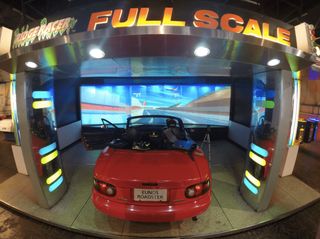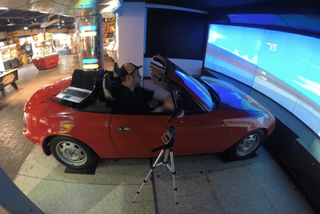The spectacular 3-screen Ridge Racer arcade sim left to rot, and the fans who saved a '90s treasure
Getting off the grid.

Namco's beloved Ridge Racer series saw its first entry in 1993, the culmination of years developing lesser-known arcade driving cabinets. The game saw huge success, as part of which Namco designed a super-deluxe version that featured a full-scale car that controlled a version of the game played on an enormous screen. It was so big, and so special, that few were ever installed, even fewer survive: and one of the last known remaining examples had, after running for decades, seemingly been left to rust and rot in Blackpool.
Much more detail on these predecessor cabinets and the road to Ridge Racer can be read on the excellent Arcade Blogger. The showpiece cabinet was called Ridge Racer Full Scale, where players sat inside a red Eunos Roadster chassis and controlled the same car on-screen, naturally using the in-car wheel, gear stick and pedals. You even used the ignition key to start it up, and fiddling with the car's instruments reflected what was happening in-game. In front of the car is a 10 foot wide triple screen, and as you play fans blast air and in-built speakers play the engine noises and background music. The Ridge Racer Full Scale was an absolute beast, with a $250,000 price tag to match.
Unsurprisingly, it did not see wide distribution. The game was so unusual that Namco's engineers would have to travel to their customers and design each cabinet for the space available: that is, no two versions of Ridge Racer Full Scale were the same. The customisation was such that Namco would add the arcade operator's name and logo to the title screen.
The cabinet can be seen in action here.
No one knows exactly how many of these machines were sold, mainly because many were destroyed at the end of their functional life. One of the only operational Full Scale machines remaining, until recently, could be found in the UK city of Blackpool. Here is one James Newman, who also kindly gave us permission to use his photographs of the cabinet, showing off some serious skills.
This cabinet required an engineer dedicated to keeping it running but, at some point after Newman's visit above, photographs began to circulate among enthusiasts showing the setup had been shut down and seemed abandoned. Enquiries were made as to purchasing it: no sale, said the arcade. Arcade Blogger's Tony Temple reasons that this is probably the last operational Ridge Racer Full Scale in the world.
Sometime in 2020, an individual attempted to acquire the setup, with the intention of donating it to the National Videogame Museum in Sheffield. An agreement was arrived at, and it seemed that things would go well: there were new photographs, this time showing the structure being dismantled and loaded onto a truck. There did appear to be some damage, such as the car's smashed windscreen, but nothing unrecoverable.
The biggest gaming news, reviews and hardware deals
Keep up to date with the most important stories and the best deals, as picked by the PC Gamer team.
Unfortunately, after this, the thing appeared to be stored in various places, including a garage and outdoors. The National Videogame Museum appeared to know little about the deal for it to take on the cabinet and added "As far as we’ve been told, there has been some recent water damage to the unit, which might make it impossible".

It later said it hadn't been contacted before the purchase and, because of its current condition and storage implications, it would not be accepting the cabinet.
The purchaser, at this point, went dark. "Incredibly, the last remaining Ridge Racer Full Scale appeared to have been left to rot," writes Temple. "And even worse, some of the main framework, allegedly had gone to scrap, now ruined by the elements."
Another arcade collector with considerable restoration experience adds that "The game code is about 8 chips away from saveable though, which also makes it maddening".
Things got even more bizarre, when someone new appeared in the arcade community claiming they'd just moved into a house and found elements of the structure in the garage. There was some speculation this was the purchaser, in an attempt to save face.
This story, eventually, has had something of a happy ending.
"After much confusion, discussion and back and forth with the ‘new’ owner, I’m pleased to report that earlier this year, the remains of the Ridge Racer Full Scale cabinet were collected, including the shell of the MX5," writes Temple. The hardware is largely intact, though the physical structure is not and is believed to have been scrapped. The cabinet is now with a member of the UK's arcade community who has the intention and resources to rebuild and get it operational again.
While the Ridge Racer series has been dormant for the past 10 years, its legacy is significant. It was one of the big series of the '90s, a crucial game in arcade and racing history, and loved by millions of players all over the world. If this tale shows anything, it's how even the most cherished and unique games can suffer the neglect of time and, when it comes to arcade hardware especially, are at risk of disappearing forever. Who knows, there may well be another operational Ridge Racer Full Scale out there, but at the moment this seems to be the only prospect of keeping a part of arcade history alive: and what a bombastic, over-the-top, adorable part it is.
The game's ROMs have now been dumped and it can be run in emulation. This is a work-in-progress though the intent is eventually to make it public.
Let's raise a glass, then, to the gamers who cared enough about this part of history to go out there and do something about it. Who persisted through this bizarre ownership kerfuffle, kept asking questions, who saw rust growing on this thing and determined they would save such a glorious object from that ignominious end: and did.
Thanks to Tony Temple for documenting this story: you can check out a podcast he works on here, which interviews golden age videogame greats, and he's also written a book on Missile Command.
Rich is a games journalist with 15 years' experience, beginning his career on Edge magazine before working for a wide range of outlets, including Ars Technica, Eurogamer, GamesRadar+, Gamespot, the Guardian, IGN, the New Statesman, Polygon, and Vice. He was the editor of Kotaku UK, the UK arm of Kotaku, for three years before joining PC Gamer. He is the author of a Brief History of Video Games, a full history of the medium, which the Midwest Book Review described as "[a] must-read for serious minded game historians and curious video game connoisseurs alike."
Most Popular






